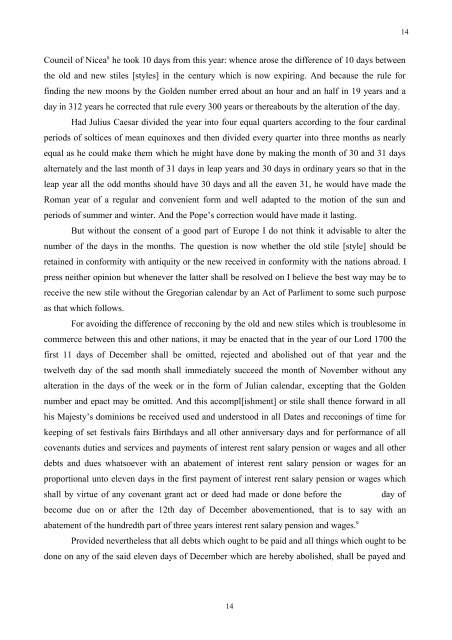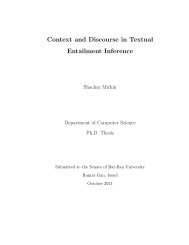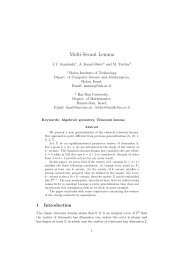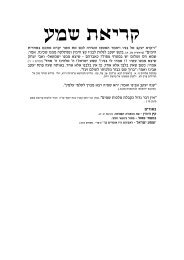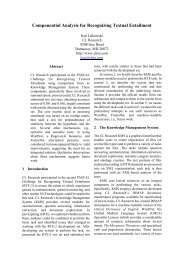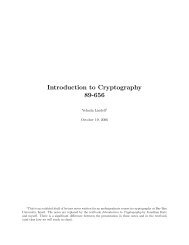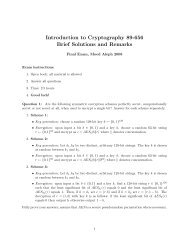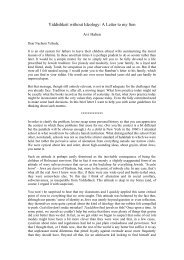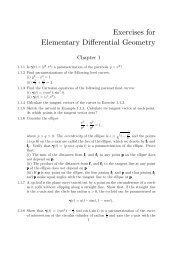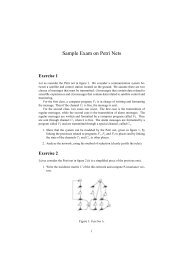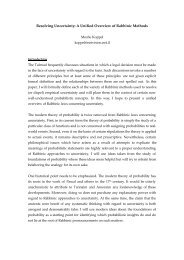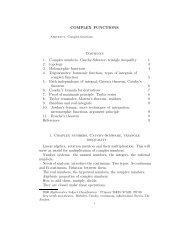Reform of the Julian Calendar as Envisioned by Isaac Newton
Reform of the Julian Calendar as Envisioned by Isaac Newton
Reform of the Julian Calendar as Envisioned by Isaac Newton
You also want an ePaper? Increase the reach of your titles
YUMPU automatically turns print PDFs into web optimized ePapers that Google loves.
14<br />
Council <strong>of</strong> Nicea 8 he took 10 days from this year: whence arose <strong>the</strong> difference <strong>of</strong> 10 days between<br />
<strong>the</strong> old and new stiles [styles] in <strong>the</strong> century which is now expiring. And because <strong>the</strong> rule for<br />
finding <strong>the</strong> new moons <strong>by</strong> <strong>the</strong> Golden number erred about an hour and an half in 19 years and a<br />
day in 312 years he corrected that rule every 300 years or <strong>the</strong>reabouts <strong>by</strong> <strong>the</strong> alteration <strong>of</strong> <strong>the</strong> day.<br />
Had Julius Caesar divided <strong>the</strong> year into four equal quarters according to <strong>the</strong> four cardinal<br />
periods <strong>of</strong> soltices <strong>of</strong> mean equinoxes and <strong>the</strong>n divided every quarter into three months <strong>as</strong> nearly<br />
equal <strong>as</strong> he could make <strong>the</strong>m which he might have done <strong>by</strong> making <strong>the</strong> month <strong>of</strong> 30 and 31 days<br />
alternately and <strong>the</strong> l<strong>as</strong>t month <strong>of</strong> 31 days in leap years and 30 days in ordinary years so that in <strong>the</strong><br />
leap year all <strong>the</strong> odd months should have 30 days and all <strong>the</strong> eaven 31, he would have made <strong>the</strong><br />
Roman year <strong>of</strong> a regular and convenient form and well adapted to <strong>the</strong> motion <strong>of</strong> <strong>the</strong> sun and<br />
periods <strong>of</strong> summer and winter. And <strong>the</strong> Pope’s correction would have made it l<strong>as</strong>ting.<br />
But without <strong>the</strong> consent <strong>of</strong> a good part <strong>of</strong> Europe I do not think it advisable to alter <strong>the</strong><br />
number <strong>of</strong> <strong>the</strong> days in <strong>the</strong> months. The question is now whe<strong>the</strong>r <strong>the</strong> old stile [style] should be<br />
retained in conformity with antiquity or <strong>the</strong> new received in conformity with <strong>the</strong> nations abroad. I<br />
press nei<strong>the</strong>r opinion but whenever <strong>the</strong> latter shall be resolved on I believe <strong>the</strong> best way may be to<br />
receive <strong>the</strong> new stile without <strong>the</strong> Gregorian calendar <strong>by</strong> an Act <strong>of</strong> Parliment to some such purpose<br />
<strong>as</strong> that which follows.<br />
For avoiding <strong>the</strong> difference <strong>of</strong> recconing <strong>by</strong> <strong>the</strong> old and new stiles which is troublesome in<br />
commerce between this and o<strong>the</strong>r nations, it may be enacted that in <strong>the</strong> year <strong>of</strong> our Lord 1700 <strong>the</strong><br />
first 11 days <strong>of</strong> December shall be omitted, rejected and abolished out <strong>of</strong> that year and <strong>the</strong><br />
twelveth day <strong>of</strong> <strong>the</strong> sad month shall immediately succeed <strong>the</strong> month <strong>of</strong> November without any<br />
alteration in <strong>the</strong> days <strong>of</strong> <strong>the</strong> week or in <strong>the</strong> form <strong>of</strong> <strong>Julian</strong> calendar, excepting that <strong>the</strong> Golden<br />
number and epact may be omitted. And this accompl[ishment] or stile shall <strong>the</strong>nce forward in all<br />
his Majesty’s dominions be received used and understood in all Dates and recconings <strong>of</strong> time for<br />
keeping <strong>of</strong> set festivals fairs Birthdays and all o<strong>the</strong>r anniversary days and for performance <strong>of</strong> all<br />
covenants duties and services and payments <strong>of</strong> interest rent salary pension or wages and all o<strong>the</strong>r<br />
debts and dues whatsoever with an abatement <strong>of</strong> interest rent salary pension or wages for an<br />
proportional unto eleven days in <strong>the</strong> first payment <strong>of</strong> interest rent salary pension or wages which<br />
shall <strong>by</strong> virtue <strong>of</strong> any covenant grant act or deed had made or done before <strong>the</strong> day <strong>of</strong><br />
become due on or after <strong>the</strong> 12th day <strong>of</strong> December abovementioned, that is to say with an<br />
abatement <strong>of</strong> <strong>the</strong> hundredth part <strong>of</strong> three years interest rent salary pension and wages. 9<br />
Provided never<strong>the</strong>less that all debts which ought to be paid and all things which ought to be<br />
done on any <strong>of</strong> <strong>the</strong> said eleven days <strong>of</strong> December which are here<strong>by</strong> abolished, shall be payed and<br />
14


